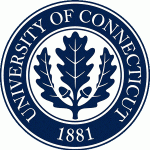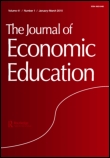Profs. Harmon, Alpert, coauthors Archita Banik (UConn, Ph.D., 2013), and James Lambrinos have an article “Class Absence, Instructor Lecture Notes, Intellectual Styles, and Learning Outcomes” recently accepted for publication in the Atlantic Economic Journal. 
Harmon
2014 Spring Awards Banquet
 On April 17, the department convened for an awards banquet that recognized the best among undergraduate and graduate students, as well as faculty. This year’s award recipients are:
On April 17, the department convened for an awards banquet that recognized the best among undergraduate and graduate students, as well as faculty. This year’s award recipients are:
Omicron Delta Epsilon inductees:
Kaylyn Caliri
John Giannone
Sam Katz
Meiling Kry
Paul Morris
Freida Parsons
Pooja Patel
Muhammad Razzaq
Undergraduate Awards
Louis D. Traurig Scholarship
Xueqi Ban
Dillon Pierce Bushby
Xia Hua
Monica Mula
Kenneth Perez
Johnny Hua Pham
Shravan Rao
Emily Seyle
Ross Mayer Scholarship
Salman Sherwani
Farha Choudhury
Paul N. Taylor Memorial Prize
Kateri Ciccaglione
Albert E. Waugh Scholarship
Robert Roche
Economics Department General Scholarship
Robert Roche
Lilian Cheung
Julia & Harold Fenton and Yolanda & Augustine Sineti Scholarship
Paul Morris
Kathryn A. Cassidy Economics Scholarship
Michael Cinque
Zachary Mitchell
Graduate Awards
W. Harrison Carter Award
Rebecca Germino
Abraham Ribicoff Graduate Fellowship
Huanan Xu
Economics Department Graduate Fellowship
Jesse Kalinowski
Chao Zheng
Tao Song
Aaron Cooke
Timothy A. and Beverly C. Holt Economics Fellowship
Rong Zhou
Zheng Xu
Peijingran Yu
Bryce Casavant
Yishu Zhou
Chao Zheng
Tao Song
Farrell Oral History Project
Sadullah Yildirim
Faculty Awards
Grillo Family Research Award
Talia Bar
Grillo Family Teaching Award
Richard Suen
Congratulations to everyone!
Profs. Alpert and Harmon, and PhD candidates Szarka and Tomolonis present at the 2014 Annual AEA Meetings in Philadelphia, PA
 Professors William Alpert and Oskar Harmon, and PhD candidates Robert Szarka and Paul Tomolonis presented “An Interactive Graphing Activity” in the AEA Committee on Economic Education Poster Session at the annual ASSA 2014 Conference in Philadelphia, PA. Their presentation demonstrated several problem sets where students use the drawing tool within Google Drive to create economic diagrams. Relying on the concept of learning-by-doing, these online activities give students the opportunity to practice drawing economic diagrams representing the core principles in their microeconomics textbook. That is, the act of drawing the diagram will reinforce student understanding of the economic concept. Working with Adam Nemeroff (Instructional Designer in the Uconn Institute of Teaching and Learning), the authors anticipate that using Google drawings in principles of economics courses at Uconn will promote the use of other products in Goggle Apps @ Uconn, build skills for upper division course work, and encourage collaborations across disciplines.
Professors William Alpert and Oskar Harmon, and PhD candidates Robert Szarka and Paul Tomolonis presented “An Interactive Graphing Activity” in the AEA Committee on Economic Education Poster Session at the annual ASSA 2014 Conference in Philadelphia, PA. Their presentation demonstrated several problem sets where students use the drawing tool within Google Drive to create economic diagrams. Relying on the concept of learning-by-doing, these online activities give students the opportunity to practice drawing economic diagrams representing the core principles in their microeconomics textbook. That is, the act of drawing the diagram will reinforce student understanding of the economic concept. Working with Adam Nemeroff (Instructional Designer in the Uconn Institute of Teaching and Learning), the authors anticipate that using Google drawings in principles of economics courses at Uconn will promote the use of other products in Goggle Apps @ Uconn, build skills for upper division course work, and encourage collaborations across disciplines.
For a preview of the presentation click here.
Profs Harmon, Alpert, and PhD Candidate Joseph Histen publish article
 Professors Oskar R. Harmon, William T. Alpert, and PhD Candidate Joseph Histen, have been published the article “Online Discussion and Learning Outcomes” in the Journal International Advances in Economic Research, 2014.
Professors Oskar R. Harmon, William T. Alpert, and PhD Candidate Joseph Histen, have been published the article “Online Discussion and Learning Outcomes” in the Journal International Advances in Economic Research, 2014.
This paper describes how the authors used Facebook as a discussion tool in the instruction of a principles level economics course and reports empirical estimates of the effect of that use on learning outcomes. Social media as a tool for promoting classroom discussion has advantages and disadvantages. For example, its omnipresence and flat learning curve can promote academic discourse. However social media can promote non-academic “chatting”, and its omnipresence means the user needs more than a passing knowledge of the privacy settings to have control of their “digital identity. For a Principles of Microeconomics taught in 2011 we collected data, with permission from our institution’s Institutional Review Board, on student use of Facebook, academic and demographic characteristics, learning style preferences and learning outcomes. Overall our empirical estimates provide cautious support for the hypothesis that active participation in the discussion board has a positive effect on exam score at a statistically significant level. The estimates of the effect of posts related to question and answer dialogue show a positive impact on the cumulative final exam score at a 5% level of statistical significance. This result is consistent with the view that using Facebook in academic instruction can be an effective tool for assisting the average student to resolve questions about the course material and for promoting peer-to-peer learning.
Professors Alpert and Harmon Present at Atlantic Economic Conference
 William Alpert and Oskar Harmon presented the paper
William Alpert and Oskar Harmon presented the paper
“Practical Experience with Online/Blended Course Delivery: Questions for Research” at the 75th International Atlantic Economic Conference , Philadelphia, PA, 4-7 October, 2013.
Prof. Alpert presents to The Society of Economic Educators
 Professor William Alpert presented by invitation a paper entitled, “The Alpha of A Survey of The Literature In Economic And Financial Literacy,” with Professor Oskar R. Harmon to The Society of Economic Educators. The Society is an elected professional group of economic educators (limited to 30 members who are selected by election). Professor Alpert has served the society as program chair (president elect), President and Past President and has been a member for more than a decade.
Professor William Alpert presented by invitation a paper entitled, “The Alpha of A Survey of The Literature In Economic And Financial Literacy,” with Professor Oskar R. Harmon to The Society of Economic Educators. The Society is an elected professional group of economic educators (limited to 30 members who are selected by election). Professor Alpert has served the society as program chair (president elect), President and Past President and has been a member for more than a decade.
Profs. Alpert and Harmon speak at Dept. of Public Policy’s Speaker Series
![]() Professors William Alpert and Oskar Harmon were invited speakers at the Uconn Department of Public Policy Seminar Series, February 19, 2013.
Professors William Alpert and Oskar Harmon were invited speakers at the Uconn Department of Public Policy Seminar Series, February 19, 2013.
Since Fall 2011, the Economics Department has been experimenting with instruction in fully online format (no in class meetings), and blended format (combination of online lecture and in-class discussion). In their talk, Professors Alpert and Harmon discussed strategy and course design for online/blended classes with large number of sections, and their working paper “The Effectiveness of Interactive Online Exercises across Delivery Format.” Their paper uses a fixed effects model and reports empirical estimates consistent with the hypothesis that participation in interactive learning exercises has a positive effect on exam score at a statistically significant level.
Professor Harmon in the Journal of Economic Education
 Prof. Oskar Harmon, with his co-author Prof. James Lambrinos (Union Graduate College) had their paper Active Learning Exercises for Principles of Economics Courses” published in the Summer 2012 issue of the Journal of Economic Education (JEE). The JEE is a leading journal in the field of economic education and publishes articles on topics in teaching economics. Prof. Harmon’s article is included in the section of the journal dedicated to innovative electronic technology. In the paper Prof. Harmon and his co-author design a wiki to utilize current events and flash-based tools for instruction of concepts commonly taught in principles of economics courses.
Prof. Oskar Harmon, with his co-author Prof. James Lambrinos (Union Graduate College) had their paper Active Learning Exercises for Principles of Economics Courses” published in the Summer 2012 issue of the Journal of Economic Education (JEE). The JEE is a leading journal in the field of economic education and publishes articles on topics in teaching economics. Prof. Harmon’s article is included in the section of the journal dedicated to innovative electronic technology. In the paper Prof. Harmon and his co-author design a wiki to utilize current events and flash-based tools for instruction of concepts commonly taught in principles of economics courses.
Professors Alpert and Harmon present at AEA
![AEA[1]](https://uconnecon.files.wordpress.com/2013/01/aea1.jpg?w=300) Professor William Alpert and Professor Oskar Harmon were panel discussants in the session “The Effects of Online Economics Courses on Student Learning” and presented the paper “The Effectiveness of Interactive Online Exercises across Delivery Format”, co-authored with Professor James Lambrinos (Union Graduate College) at the American Economic Association, Annual Meetings, San Diego CA, Jan 3-6, 2013. Their paper evaluates the effectiveness of online activities controlling for delivery format. The data are from a Principles of Microeconomics class taught in three different delivery formats: traditional lecture, fully online (no in class meetings), or blended (combination of online lecture and in-class discussion. Overall the empirical estimates are consistent with the hypothesis that participation in interactive learning exercises has a positive effect on exam score at a statistically significant level. Professors Alpert and Harmon were also panel discussants in the session “The Effects of Online Economics Courses on Student Learning.”
Professor William Alpert and Professor Oskar Harmon were panel discussants in the session “The Effects of Online Economics Courses on Student Learning” and presented the paper “The Effectiveness of Interactive Online Exercises across Delivery Format”, co-authored with Professor James Lambrinos (Union Graduate College) at the American Economic Association, Annual Meetings, San Diego CA, Jan 3-6, 2013. Their paper evaluates the effectiveness of online activities controlling for delivery format. The data are from a Principles of Microeconomics class taught in three different delivery formats: traditional lecture, fully online (no in class meetings), or blended (combination of online lecture and in-class discussion. Overall the empirical estimates are consistent with the hypothesis that participation in interactive learning exercises has a positive effect on exam score at a statistically significant level. Professors Alpert and Harmon were also panel discussants in the session “The Effects of Online Economics Courses on Student Learning.”
Professor Harmon Presents at ITL Lunchtime Workshop
![dlc[1]](https://uconnecon.files.wordpress.com/2012/11/dlc1.png?w=150) Prof. Oskar Harmon co-presented with Professor Steven Park at the Uconn Institute of Teaching and Learning’s lunchtime workshop “Mobile Learn for Students” on Nov. 6 2012. The seminars provide an opportunity to gather with colleagues to listen, discuss, comment, interact, and reflect on a number of topics. Prof. Harmon is part of the Fall 2012 Mobile Learn pilot project exploring the capabilities of the mobile App for BlackBoard Next Generation. At the workshop Prof. Harmon discussed his experience with creating tests, announcements, and multimedia course content for mobile devices.
Prof. Oskar Harmon co-presented with Professor Steven Park at the Uconn Institute of Teaching and Learning’s lunchtime workshop “Mobile Learn for Students” on Nov. 6 2012. The seminars provide an opportunity to gather with colleagues to listen, discuss, comment, interact, and reflect on a number of topics. Prof. Harmon is part of the Fall 2012 Mobile Learn pilot project exploring the capabilities of the mobile App for BlackBoard Next Generation. At the workshop Prof. Harmon discussed his experience with creating tests, announcements, and multimedia course content for mobile devices.